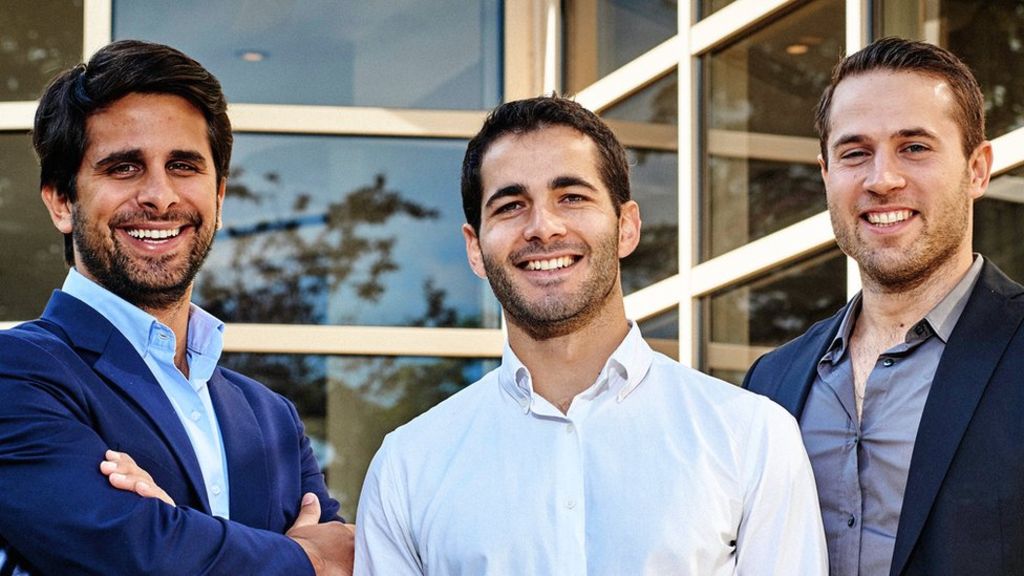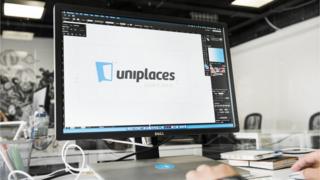The three friends making it easier for students to rent a room – BBC News

 Image copyright Uniplaces
Image copyright Uniplaces While many people look back on their university days with fondness, the one thing they probably don’t miss is the student accommodation.
If it wasn’t grotty, it was too expensive, or often both.
Recalling their college days, friends Miguel Amaro, Ben Grech and Mariano Kostelec all say that their biggest problem was finding somewhere to live in the first place.
“Our experience was horrible,” says 28-year-old Englishman Ben.
“As an international student from Argentina, Mariano had to pay 12 months’ rent up-front to get his place in London.
“Meanwhile, Miguel [who is from Portugal] booked some random super-expensive residence in Nottingham because he didn’t know any better, and I was looking around the streets of Nottingham knocking on doors trying to find a place.”

While it was irksome at the time, a year after graduating from their respective universities – Miguel and Ben from Nottingham University, and Mariano from King’s College in London – the three men realised that there was a business opportunity.
They came up with a plan to create an online marketplace matching students with accommodation.
Ben says: “It was clear that people were doing more online and that marketplaces such as Airbnb were a great solution for travel, but finding accommodation was such a problem for students around the world.”
So in 2011 the three started work on their business and website Uniplaces.
The trio invested around 50,000 – a sum whipped up from their savings, student loans and help from parents.
 Image copyright BBC Sport
Image copyright BBC Sport To save on costs, the men stayed at Miguel’s parents’ holiday home in Ponte de Lima in northern Portugal, before participating in start-up competitions to win free office space, first in Porto, the country’s second city, and then in the capital Lisbon.
Later that year they won first round funding of 200,000 euros ($215,000; 172,534) led by the founder of UK property website Zoopla.
From there it was down to business, getting a permanent office in Lisbon, and wooing landlords to join the site and checking properties.
The Uniplaces website was then officially launched in 2013, with an initial 50 properties in the Portuguese capital listed on the site.
Mariano, 28, says: “We picked Lisbon as our first city as it totally made sense to stay [and open headquarters here].
“It is a low cost, good location with access to great talent such as good engineers, and people with excellent language skills, which is great when dealing with so many international students.
“For the first hundred plus properties we actually went round them ourselves with our cameras taking pictures, cleaning the places up and asking people to get out of the room.”
Commission based
Students using Uniform pay one month’s rent upfront via the website, and the sum goes through to the landlord 24 hours after they move in. Thereafter they pay directly to the landlord.
Uniplaces takes a service fee of 20-25% of the student’s first month’s rent, and then a commission of 5-12% of the total value of the contract from the landlord.
 Image copyright Uniplaces
Image copyright Uniplaces More than half of all properties featured on the site are still verified by Uniplaces staff who visit the property to take pictures and videos, draw up a floor plan and inventory list.
Since its launch, three million nights have been booked through the platform, which currently lists over 40,000 properties.
Revenues grew four-fold in 2016 compared to the previous year, but with the money being reinvested into the business Uniplaces is yet to turn a profit.
The company, which now has 132 employees, has also continued to attract the attention of investors. Last year it received $24m (19) in its fifth round of funding.
The capital has been used to fund expansion, build brand awareness, fine-tune the product, and appoint extra staff.
 Image copyright Getty Images
Image copyright Getty Images But it hasn’t been all plain-sailing for the three entrepreneurs. Initially they were too ambitious and tried to expand too quickly.
Miguel, 27, says: “We wanted to be a global start-up so we quickly launched in 70 cities. But then you start compromising.”
With properties spread across so many cities, they were no longer able to verify enough of the properties.
Miguel adds: “Investors want results, but then you realise you need to focus and deliver a good experience for the customer and make sure landlords’ properties are getting filled up.
“That helps grow a more successful company. It’s a balance of ambition. We want to get out to the world but we have to stage it. So in 2016 we went down to six cities and focused on them.”
Today the business has expanded back up to 15 cities – London, Manchester, Nottingham, Lisbon, Coimbra, Porto, Madrid, Barcelona, Valencia, Rome, Bologna, Milan, Paris, Berlin and Munich.
‘Fairly innovative’
Jack Wallington, community director at student community website, The Student Room, notes that in recent years student accommodation has changed dramatically.
“Dedicated companies have popped up offering purpose-built student flats across the UK and other accommodation services.
“Alongside the standard mix of landlords it can be hard for students to know who to turn to and trust. Uniplaces is fairly innovative because its interest lies more with the student, supporting first-time renters to find good deals.”
 Image copyright Uniplaces
Image copyright Uniplaces While Uniplaces retains global ambitions, Mariano says that for the time being it will focus on Europe.
The ambitious trio also have visions of creating a more wide-ranging university brand.
From next year students will receive a welcome pack including useful materials such as a sim card, and a travel card when they arrive at their new digs.
There’ll also be the launch of an app where Uniplaces brand ambassadors will be on hand to answer any questions students might have about their new city.
Further in the pipeline are plans to enable students who might have booked to rent a room in the same property to build a relationship through social media before they move in.
Ben says that the aim of such initiatives is to make renting student accommodation through Uniplaces as “welcoming” as possible.
Read more: http://www.bbc.co.uk/news/business-38735566